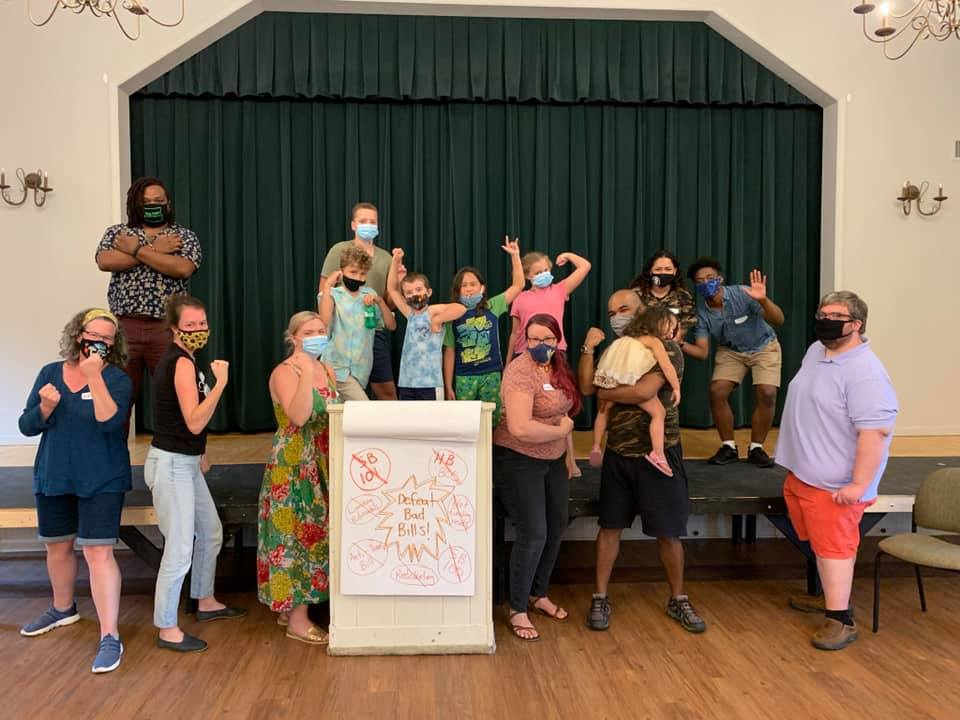
Above: Gathering with supporters to learn about SB 101 and other bad bills and prepare to oppose them, summer 2021. Photo: Isabell Moore / AFSC
While staying in conversation and aware of federal immigration policy with the AFSC as a whole in 2021, NC Immigrant Rights (NCIR) focused on grassroots organizing in North Carolina. Here are a few highlights from our ongoing work:
North Carolina's black and brown communities continue to be criminalized and targeted by enforcement agencies, continue to experience disproportional impact from the COVID-19 pandemic, and are also bearing the brunt of the affordable housing crisis and difficult labor conditions. During Spring and Summer 2021, state elected officials pushed for anti-immigrant legislation that could have deep implications. However internal fighting among the Republican party and their shift to the critical race theory attacks have slowed down that train. But should this legislation resurface, we have a list of supporters educated and ready to respond and support a veto, similar to when we stopped a similar bill in 2019.
With this in mind, over the last months we have held several conversations and informational sessions with faith communities, to work towards involving more communities of faith in the fight for migrant justice. Siembra NC, our closest partner organization, keeps growing, organizing more immigrants every month. But with many North Carolina residents supporting anti-immigrant sentiment, investing in ally communities and building solidarity remains imperative.
In April 2021 NCIR hired a new community organizer, Terrell Dungee. Terrell is native to the Triad area of North Carolina and honored to lend his skills and experience in organizing, base building and deep listening across racial and class lines and in rural and urban settings.
Over these last whirlwind months, Terrell has helped support solidarity committees across several NC counties, coordinated a pilot project with partner organizations doing neighborhood-based grassroots organizing in a predominantly Black area of Greensboro that is also home to many immigrant and refugee residents, and hosted and led info sessions on the anti-immigrant bill in the legislature.
Ana Maria Reichenbach completed her time as a full-time fellow with AFSC in 2021. She has done amazing coordination work for collaborative projects between Siembra NC and AFSC like the statewide hotline, ice-watch volunteer program and has played a leadership role in the collaborative vaccine project.
Sanctuary work shifted during the pandemic and the post-Trump era. Most importantly, Juana, Eliseos, and Jose have all been able to leave sanctuary and return to their families! We are so grateful for their leadership, saddened by the lengths they had to go to find some safety, and glad that they have been able to reunite with their loved ones in their homes.
The pandemic has influenced our work in multiple ways. While we are now beginning to do some socially distanced, masked outdoor events, for most of the last several months our events and trainings have been virtual. While at times a challenge, this has allowed us to engage more participants in solidarity across counties and gather people of faith from multiple locations into one virtual space.
We also organized solidarity support for Siembra NC’s vaccination project, assisting with outreach to Latinx community members and scheduling appointments during a time when vaccine accessibility was difficult. Almost 500 Latinx folks got vaccinated as result of this project.
We launched our Solidarity Listening Project, which will allow us to hear from a variety of past and potential constituents, volunteers, and partners, including people of faith, people involved in solidarity teams, Black-working class residents of multi-racial neighborhoods that include many immigrant and refugee neighbors, and non-Latinx immigrant and refugee community leaders. What we hear from these community members will help us plan our next phases of work going into 2022.
Finally, we have been organizing non-immigrant neighbors, people of faith and educators in solidarity with Siembra NC’s efforts to support a Latinx trailer park community facing eviction in Greensboro, NC. This is part of a pattern we are seeing as immigrant community members face abuses around wage theft, housing and health access. The people we have organized in solidarity with this trailer park community are learning what it means to be allies, to stand for their values and the kind of diverse and affordable community they believe in, and to organize others in service of a vision of justice.
We have felt a lifting of the tensions of the Trump era during 2021, and we also know that as we continue to live in the pandemic and face multiple inequities, there is still much work to do for immigrant rights and for the future of our state. We have been exploring new directions for our work and have had victories and organizing successes, but as always, we have a lot of work ahead.
- Isabell Moore
NC Immigrant Rights Program Director